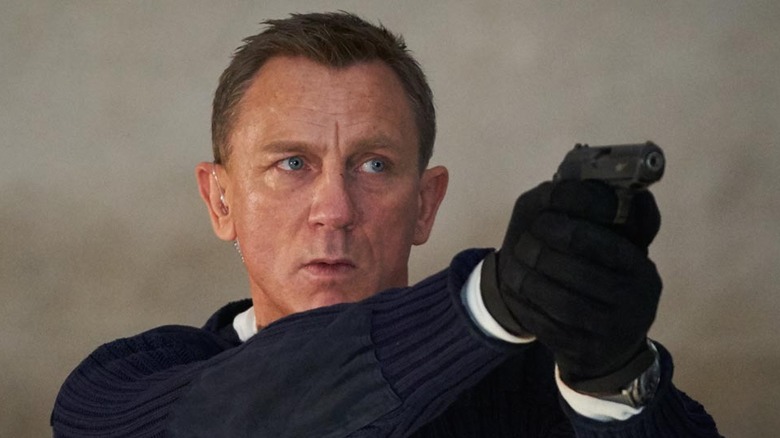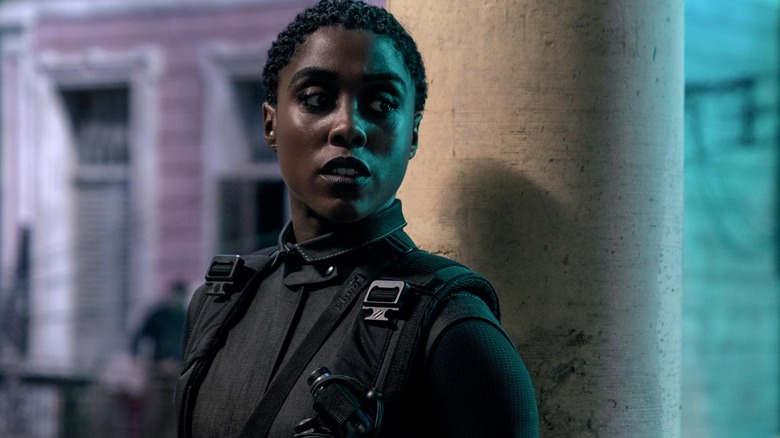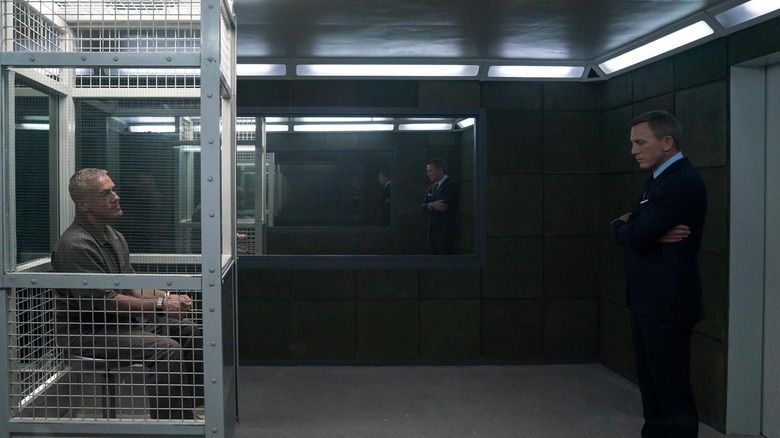No Time To Die Review: Mr. Bond's Fond Farewell
Five other men have canonically played the role, but with the oft-delayed release of "No Time to Die," Daniel Craig becomes the first James Bond to receive a true ending. Sean Connery quit the part, twice, but none of his "last chapters" were conceived as such. Roger Moore didn't know going into "A View to a Kill" that it would be his swan song. Timothy Dalton never got a third outing after "License to Kill" and one must assume if Pierce Brosnan knew the middling "Die Another Day" would be his last stab, he might have spoken up a bit more in the preproduction stage. George Lazenby's lone entry in the franchise, "On Her Majesty's Secret Service," feels strangely complete, even given its cliffhanger ending. But Craig now stands alone as the only Bond with a completed five-film arc that tells one continuous, albeit messy, story.
Since Craig's first appearance as Bond in "Casino Royale" owed so much to Christopher Nolan's "Batman Begins", and his series' height "Skyfall" so much to "The Dark Knight," it's no surprise that "No Time to Die" in many ways echoes the end of that trilogy. This is one of those rare instances when a filmmaker, in this case director Cary Joji Fukunaga, is allowed to take a treasured piece of IP and bring the never-ending second act of their lives to a close.
As with every Bond film, we know "James Bond Will Return..." But this time, we know this James Bond won't, and that fact alone gives the proceedings stakes no prior Bond has had, no matter how big the death ray pointed at Earth has been or how many bombs have been planted that must be defused at just the right time. This unique vantage point is both a blessing and a curse, as "No Time to Die" delivers the necessary Bond movie thrills while devoting considerable screentime to devising a proper send-off for this era.
Unfortunately, it also highlights some of the pitfalls of having true continuity between films, and may leave audiences hoping whatever Eon and MGM do with the character next goes in a vastly different direction.
No, Mr. Bond ... I expect you to have a reasonable runtime
At two hours and 43 minutes, "No Time to Die" is the longest movie in the Bond franchise, which is a feat given that almost all of the other 24 films, even the best ones, feel at least 20 minutes too long as it is. This is a Bond movie where we don't hear Billie Eilish's Grammy-winning title song until nearly a half hour in!
"No Time to Die" picks up directly after the open-ended finale of "Spectre," where Bond (Craig) rode off into the sunset with love interest Madeline Swann (Léa Seydoux), apparently finished with the superspy life for good. Happy endings are hard to come by in the world of Bond, and gunslingers never get to rest for long, so this final chapter begins with the primary currency in Bond's world: secrets. Bond can't fully commit to a life with Swann until he reckons with his baggage from being betrayed by Vesper Lynd, and Swann still has elements of her backstory with her father, former Quantum/Spectre baddie Mr. White, that Bond isn't privy to.
This impasse leads to Bond staying retired, but being pulled back into the game when old friend Felix Leiter (Jeffrey Wright) requires his help hunting down a Russian scientist (David Dencik) both the CIA and MI6 are after. A rogue Bond gets back into the action, crossing paths with new characters like CIA spook Paloma (Ana De Armas) and new 007 Nomi (Lashana Lynch), as well as old foes like Blofeld (Christoph Waltz) and the mysterious new Big Bad played by Rami Malek. It's a knotty, lengthy, and circular piece that winds back to the beginning of Craig's arc while moving the franchise forward.
Fukunaga brings a lot of the kinetic energy that made his first season of "True Detective" so special, so the action is largely on point and feels livelier than it did in Sam Mendes' last two efforts. His work here doesn't have the visual flair cinematographer Roger Deakins brought to "Skyfall," but he replicates some of the choppier brutality Marc Forster went for in "Quantum of Solace" with considerably better legibility in the shot-to-shot construction. It's thrilling to watch a director throw himself into the biggest budget he's ever had without losing too much of the urgency his earlier projects have been so characterized by.
But the backstage star of the show here is certainly Phoebe Waller-Bridge, who brings a freshness and levity to the proceedings that is beyond welcome, given how dour and plodding this film would have otherwise been, given the heavy subject matter. Every Bond movie for the last 22 years has been written by Neal Purvis and Robert Wade, with each of the Craig films having an additional screenwriter whose responsibility was to build on their basic structure and set pieces with more gravitas and panache. But Waller-Bridge brings a sharpness and a wit that scribes like Paul Haggis and John Logan lack.
A lot of ink will be spilled over how a new Bond movie could function post-#MeToo and how Waller-Bridge was brought in for rewrites specifically to address those concerns, but it isn't just the treatment of its female characters that she brings to the table. Paloma, Nomi, and Swann all feel more fleshed out and lived in than Bond girls of the past, but so does Bond himself, as well as ancillary characters like Ben Whishaw's Q and the aforementioned Leiter.
But balancing all this character work with the amount of action this franchise has set an expectation for means the movie still feels bloated, even if the film itself is engaging enough, and Craig's exit warranting enough, to take the necessary screen time to send him off properly.
The end of an era
It wouldn't be particularly controversial to posit that "Spectre" is the worst film in Craig's tenure, and that is due in no small part to the film's second half and the plodding way Blofeld's "reveal" echoes the equally interminable sequel/remake "Star Trek Into Darkness." Both films bend over backwards to deliver some fan service no one asked for at the expense of telling an engaging and coherent story in a way that felt indicative of the torturous decline in mainstream moviemaking when it comes to handling franchises, shared universes, and regurgitating IP ad nauseam.
"No Time to Die" smartly course corrects that grating tone, but it is still a film that has to reckon with the continuity of Craig's other films, which means they have to find a way to include Blofeld (the "author of James' pain") and work around the series' recent tendency to just keep widening the frame to find more bad guys who have secretly been behind everything that has already happened. The core motivation for Malek's new villain and the way his madness ties into Bond and Swann's histories is fascinating, but it would be even more compelling if it didn't have to live alongside the Blofeld stuff and didn't need to be threaded through an ongoing story that has been written by seven different people over 15 years.
Each of Craig's movies were isolated chapters that require heavy lifting to properly feel like one ongoing tale, especially in the face of decades of Bond movies that never bothered to contend with that kind of consistency. Whatever comes next for this franchise, one can only hope Eon gives a thought to bucking the current "cinematic universe" trend and goes back to just delivering each Bond adventure as an island unto itself. It would allow the movies to be livelier again, more nimble, more receptive to reacting to the changing movie landscape.
But those nagging frustrations wash away in this film's final few scenes. For as long as the film is and as much as it has to sew up, "No Time to Die" is the first Bond entry to leverage the emotion and connection the audience has to an exiting lead performer that '"Doctor Who" has been harnessing ever since regeneration was a thing. Craig delivers his best work with the character since he first sat behind the wheel of an Aston Martin back in 2006 and Fukunaga finds ways to visually frame his final chapter as a series of echoes from the past.
Bond movies have to try to be a lot of different things for a lot of different people, but "No Time to Die" had one job: send Daniel Craig off right. It sticks that particular landing.


